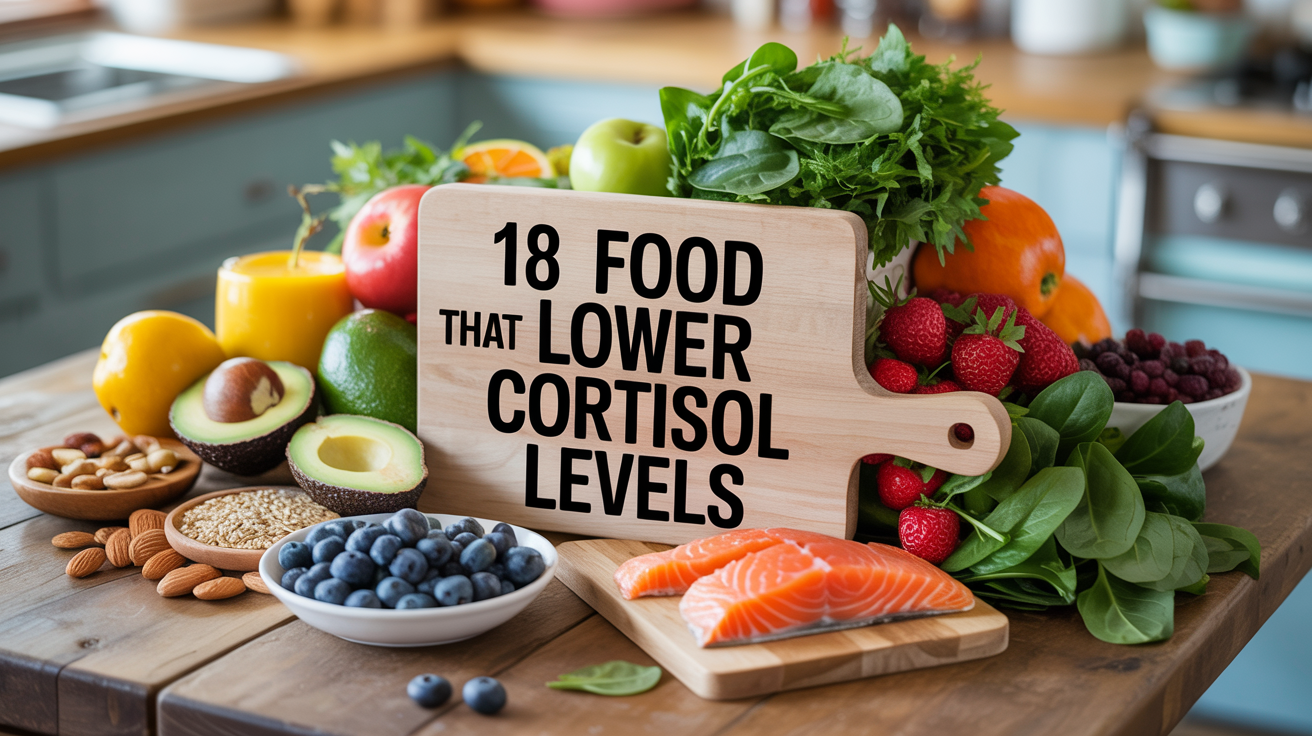Cooking your way to lower cortisol levels is all about choosing the right ingredients and using techniques that highlight their natural benefits. These recipes blend delightful flavors and nourishing elements that can help you chill out while still enjoying delicious meals. From earthy spices to soothing herbs, each dish is designed to make mealtime not just healthy but also a flavorful experience that keeps stress at bay.
1. Dark Chocolate

Dark chocolate is more than just a tasty treat; it can help lower cortisol levels. This image shows rich, dark chocolate bars surrounded by coffee beans and cocoa leaves, highlighting its natural ingredients.
The cocoa in dark chocolate contains flavonoids, which are known to reduce stress and improve mood. Eating a small amount can be a delightful way to unwind after a long day.
When choosing dark chocolate, look for varieties with at least 70% cocoa content. This ensures you get the most health benefits while still enjoying the rich flavor. Remember, moderation is key!
2. Blueberries
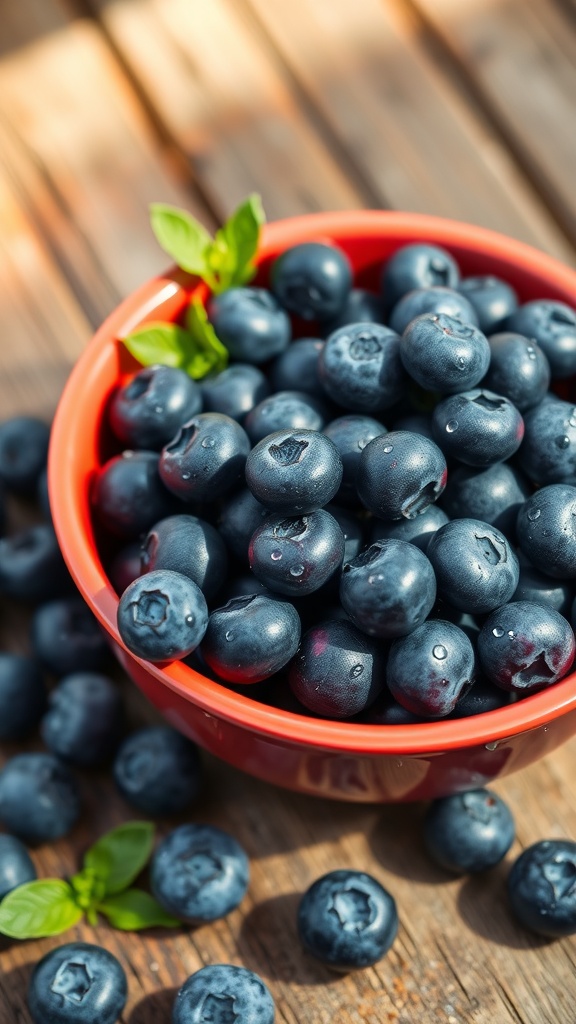
Blueberries are tiny powerhouses packed with nutrients. They are not just delicious; they also play a role in lowering cortisol levels. This image shows a vibrant bowl of fresh blueberries, glistening with moisture, ready to be enjoyed.
These little berries are rich in antioxidants, which help combat stress. Eating blueberries can support your body in managing cortisol, the stress hormone. They are easy to add to your diet—toss them in yogurt, blend them into smoothies, or enjoy them as a snack.
Incorporating blueberries into your meals can be a simple yet effective way to promote relaxation. So next time you feel stressed, grab a handful of these tasty treats!
3. Green Tea
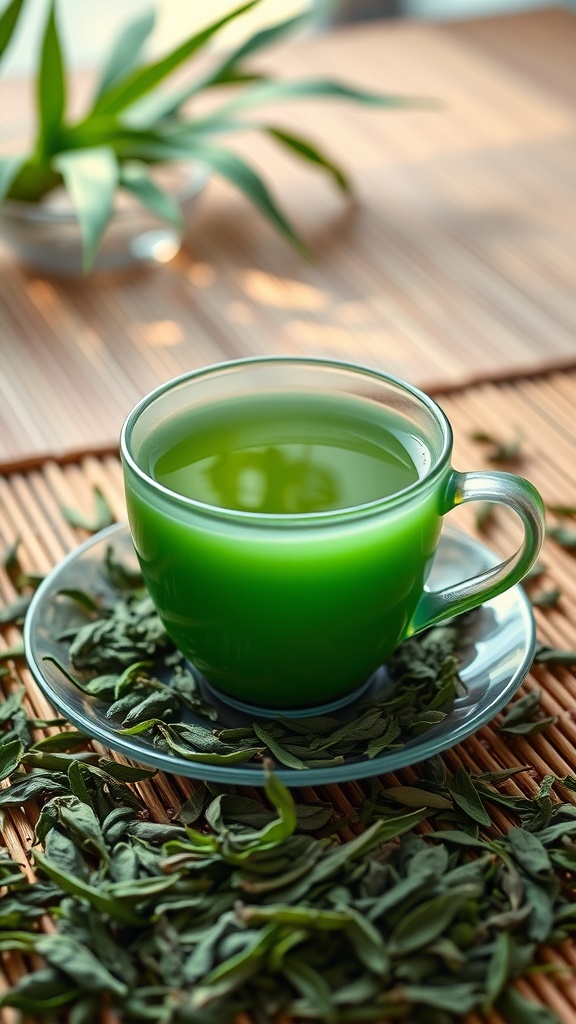
Green tea is more than just a refreshing drink; it’s a powerful ally in managing stress. The image shows a vibrant cup of green tea, surrounded by fresh green tea leaves. This visual perfectly captures the essence of what makes green tea special.
Rich in antioxidants, green tea can help lower cortisol levels, which is the hormone linked to stress. Sipping on a warm cup can bring a sense of calm, making it a great choice for those busy days.
To enjoy green tea, simply steep a tea bag or loose leaves in hot water for a few minutes. You can add a slice of lemon or a bit of honey for extra flavor. It’s a simple ritual that can brighten your day and keep stress at bay.
4. Oats
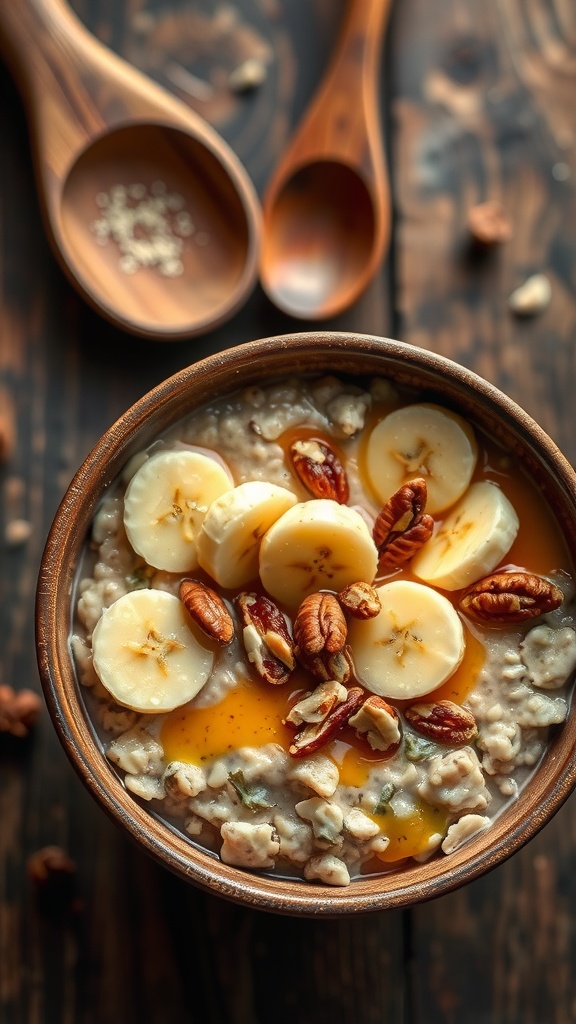
Oats are a fantastic choice for anyone looking to lower cortisol levels. They are not only nutritious but also comforting and delicious. The image shows a warm bowl of oatmeal topped with fresh banana slices and crunchy pecans. This combination is not just visually appealing; it’s packed with nutrients that can help manage stress.
Oats are rich in fiber, which helps stabilize blood sugar levels. When blood sugar is stable, cortisol levels tend to remain balanced too. The bananas add natural sweetness and potassium, which can help reduce stress. Pecans provide healthy fats and protein, making this meal satisfying and energizing.
To make a simple bowl of oatmeal, you’ll need rolled oats, water or milk, and your favorite toppings. Cook the oats according to package instructions. Once ready, top with banana slices, a handful of pecans, and a drizzle of honey if you like it sweeter. This easy recipe is perfect for breakfast or a snack!
5. Avocado
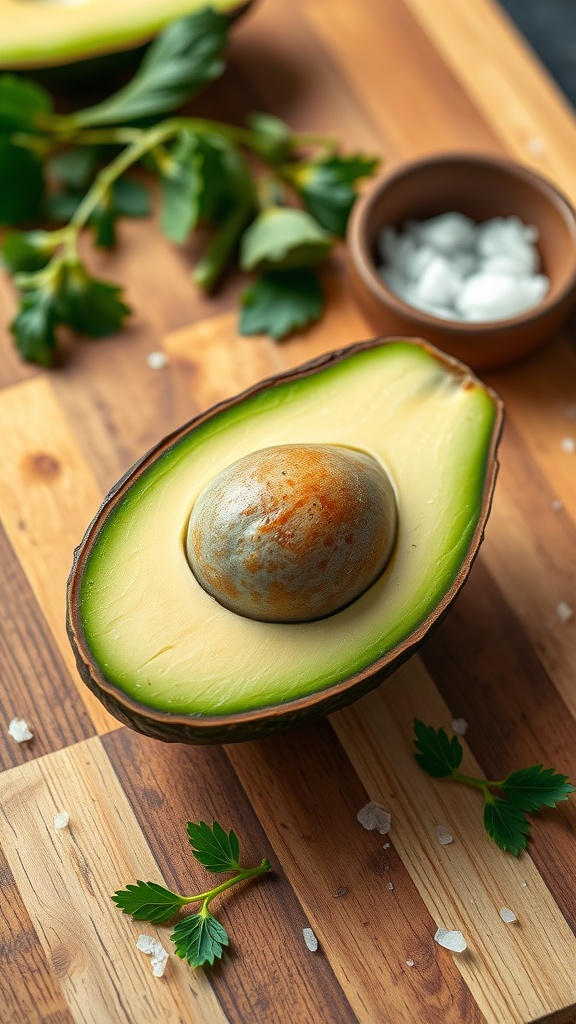
Avocados are more than just a trendy toast topping. They are packed with nutrients that can help lower cortisol levels. This creamy fruit is rich in healthy fats, fiber, and vitamins, making it a fantastic addition to your diet.
The image shows a perfectly halved avocado, revealing its smooth, green flesh and large pit. Surrounding it are fresh herbs and a small bowl of salt, hinting at delicious ways to enjoy this fruit. The vibrant colors of the avocado and herbs make it visually appealing, inviting you to incorporate it into your meals.
Eating avocados can help balance hormones and reduce stress. They contain potassium, which helps regulate blood pressure, and magnesium, known for its calming properties. Adding avocados to salads, smoothies, or even enjoying them plain can be a simple way to support your body.
6. Spinach
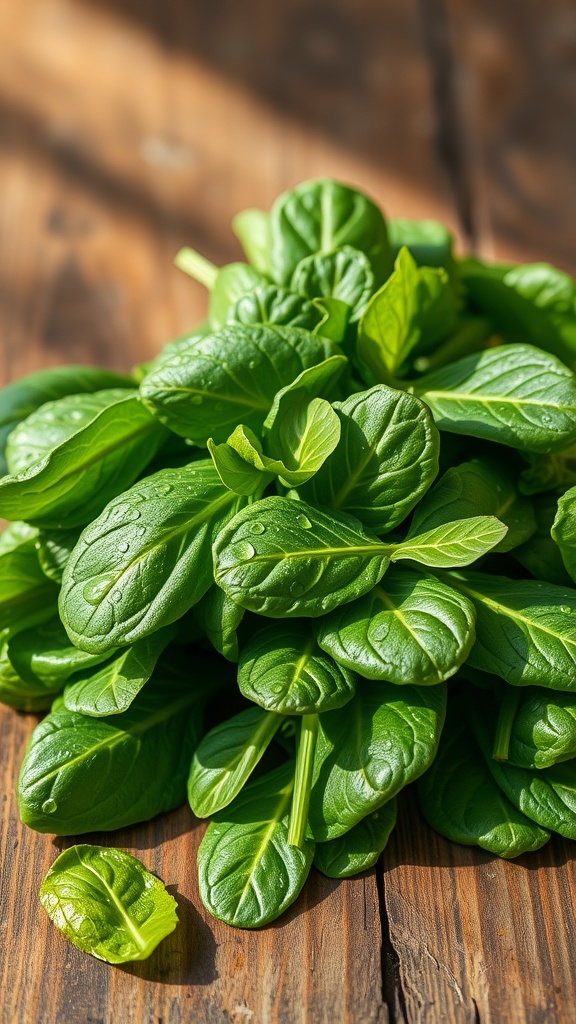
Spinach is a leafy green packed with nutrients that can help lower cortisol levels. This vibrant vegetable is not just good for Popeye; it’s a powerhouse for anyone looking to manage stress.
Rich in magnesium, spinach plays a key role in regulating cortisol. Magnesium helps to calm the nervous system, making it easier to handle stress. Plus, it’s loaded with antioxidants that fight inflammation, which can also contribute to high cortisol levels.
Incorporating spinach into your meals is easy. Toss it into salads, blend it into smoothies, or sauté it as a side dish. You can even add it to soups for an extra nutrient boost. The options are endless!
So, next time you’re at the grocery store, grab some fresh spinach. Your body will thank you for it!
7. Salmon
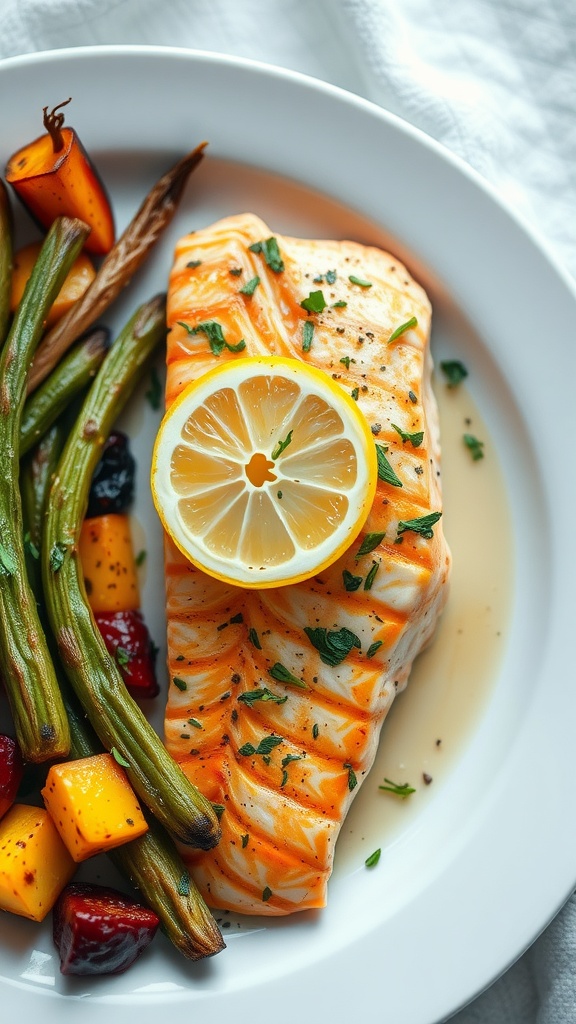
Salmon is not just a tasty fish; it’s also a fantastic food for lowering cortisol levels. This beautiful dish showcases a perfectly cooked salmon fillet, garnished with a slice of lemon and fresh herbs. The vibrant colors of the salmon and the accompanying vegetables make it visually appealing and nutritious.
Eating salmon can help reduce stress due to its high omega-3 fatty acid content. Omega-3s are known to support brain health and can help manage stress hormones. Pairing salmon with colorful veggies like green beans and bell peppers adds extra vitamins and minerals, making it a well-rounded meal.
Cooking salmon is simple. Just season it with salt, pepper, and a squeeze of lemon, then bake or grill until it flakes easily with a fork. Serve it with your favorite sides for a delicious and healthy dinner that can help keep cortisol in check.
8. Almonds
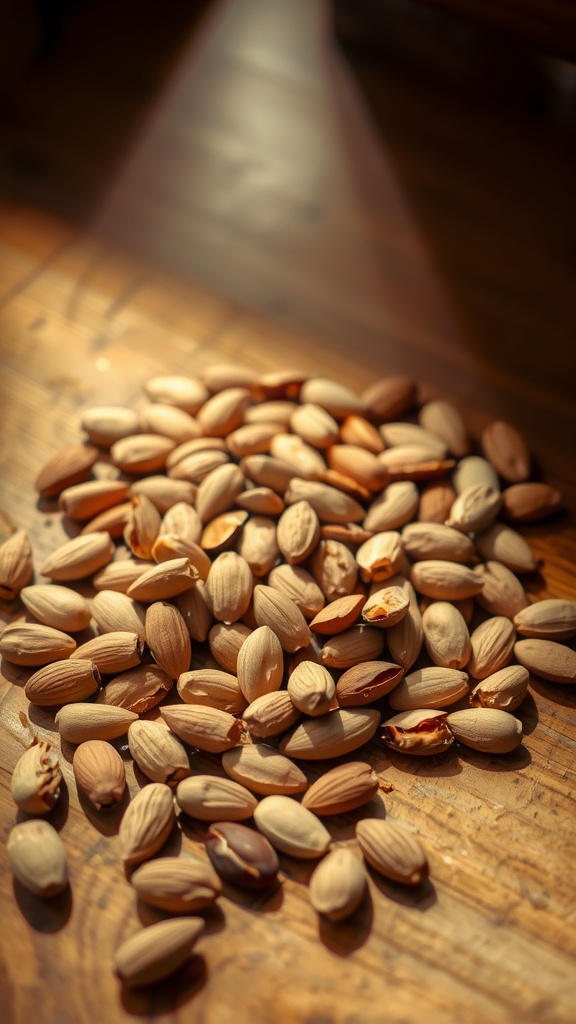
Almonds are a fantastic snack that can help lower cortisol levels. These nuts are packed with nutrients that support your body during stressful times. The image shows a beautiful spread of almonds, showcasing their natural colors and textures. The warm lighting highlights their appealing look, making them even more inviting.
Rich in magnesium, almonds help regulate cortisol production. Magnesium plays a key role in calming the nervous system. Just a handful of almonds can provide you with a good dose of this essential mineral. Plus, they are a great source of healthy fats, which can keep you feeling full and satisfied.
Incorporating almonds into your diet is easy. You can enjoy them raw, roasted, or even as almond butter. Try adding them to your morning oatmeal or tossing them into a salad for extra crunch. They can also be a great topping for yogurt or smoothies.
So next time you feel stressed, grab a handful of almonds. They are not just tasty; they also support your well-being!
9. Turmeric
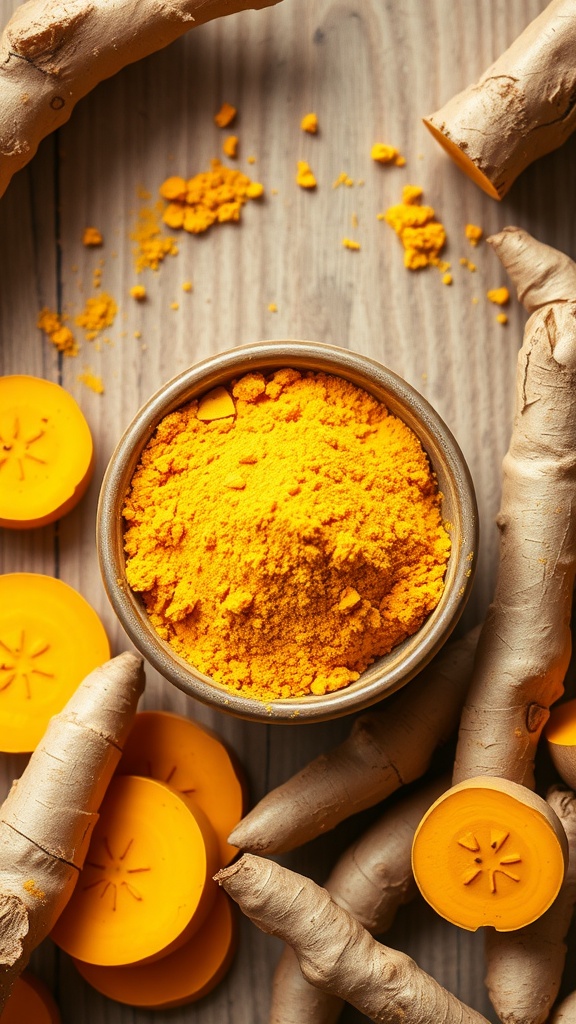
Turmeric is a bright yellow spice that comes from the root of the Curcuma longa plant. It’s not just known for its vibrant color; it has some impressive health benefits, especially when it comes to lowering cortisol levels.
The image shows a bowl filled with turmeric powder, surrounded by fresh turmeric roots and some turmeric discs. This visual highlights the spice’s natural state and its processed form. The rich yellow hue is a sign of its active compound, curcumin, which is linked to various health benefits.
Studies suggest that curcumin can help reduce stress and lower cortisol levels in the body. This makes turmeric a great addition to your diet if you’re looking to manage stress better. You can easily sprinkle it into soups, smoothies, or even golden milk for a tasty treat.
Incorporating turmeric into your meals is simple. Just start with a teaspoon of turmeric powder in your favorite dishes. You can also make a soothing turmeric tea by mixing the powder with hot water, honey, and a splash of lemon. Enjoy the warmth and the benefits!
10. Bananas
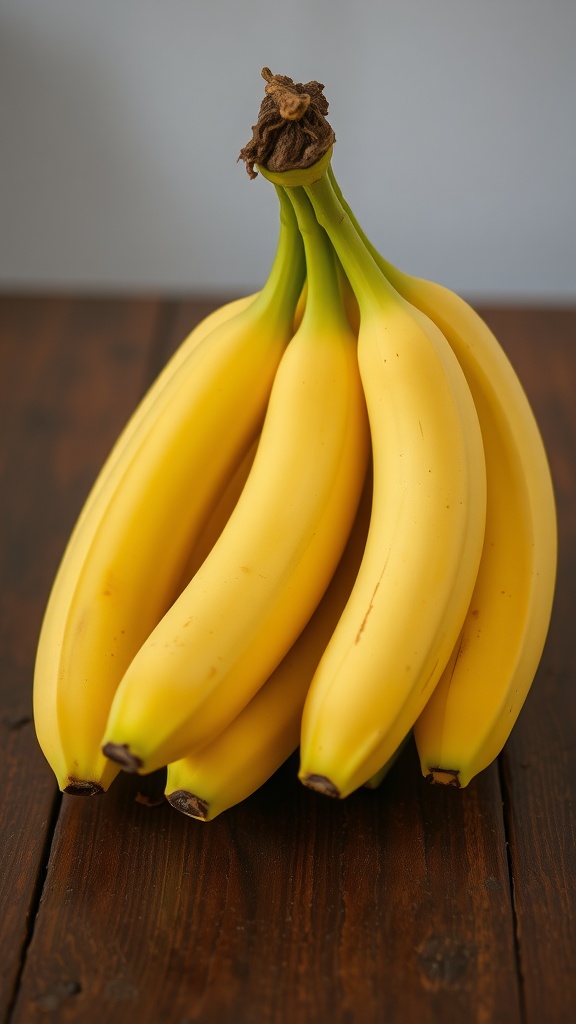
Bananas are more than just a tasty snack; they can help lower cortisol levels, which is great for managing stress. These bright yellow fruits are packed with nutrients that support your body in various ways.
One of the key reasons bananas are beneficial is their high potassium content. Potassium helps regulate blood pressure and can reduce the effects of stress on the body. When you munch on a banana, you’re not just enjoying its sweetness; you’re also giving your body a natural way to combat stress.
Bananas also contain vitamin B6, which plays a role in the production of neurotransmitters like serotonin. This “feel-good” chemical can help improve your mood and keep stress at bay. So, next time you’re feeling overwhelmed, reaching for a banana might just be the perfect choice!
Incorporating bananas into your diet is easy. You can slice them into your morning oatmeal, blend them into smoothies, or simply enjoy them on their own. They make a great addition to any meal or snack.
11. Oranges
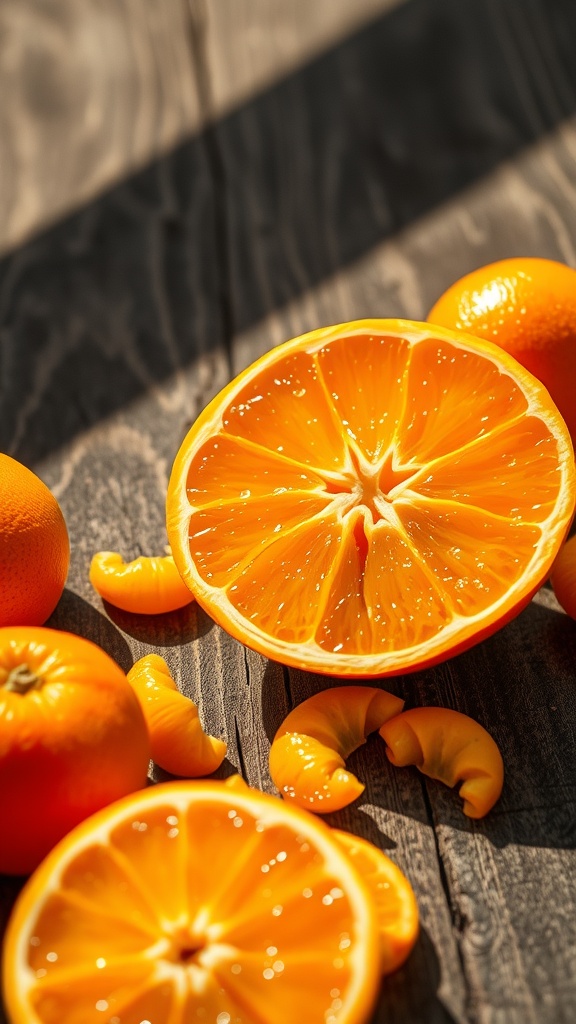
Oranges are not just a tasty snack; they play a role in managing cortisol levels. This vibrant fruit is packed with vitamin C, which is known to help reduce stress hormones in the body.
The image shows a beautiful display of oranges, with one cut in half to reveal its juicy, bright interior. The rich orange color is a visual reminder of the health benefits these fruits offer. Eating oranges can be a refreshing way to support your body during stressful times.
Incorporating oranges into your diet is easy. You can enjoy them fresh, squeeze them into juice, or add them to salads for a zesty twist. They can also be a great addition to smoothies, giving you a boost of energy and flavor.
12. Chia Seeds
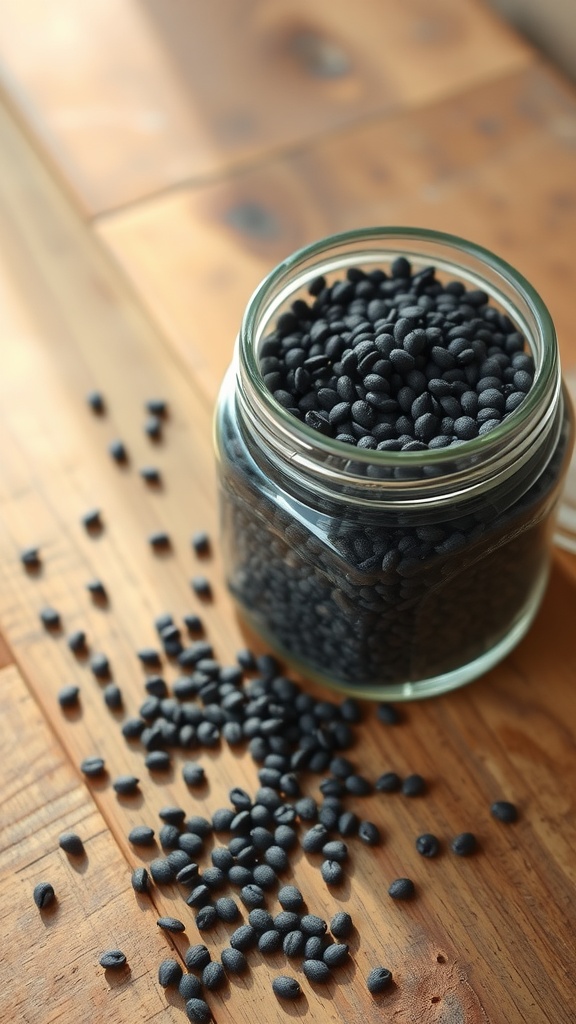
Chia seeds are tiny powerhouses packed with nutrients. They are known for their ability to absorb water, forming a gel-like substance. This makes them great for hydration and helps keep you feeling full.
These seeds are rich in omega-3 fatty acids, which can help lower cortisol levels. Including chia seeds in your diet can support your body in managing stress effectively.
They are versatile too! You can sprinkle them on yogurt, blend them into smoothies, or mix them into oatmeal. A simple way to enjoy chia seeds is by making a chia pudding. Just combine them with your favorite milk, a bit of sweetener, and let them sit overnight. The next day, you’ll have a delicious and nutritious treat!
13. Greek Yogurt

Greek yogurt is a fantastic choice for those looking to lower cortisol levels. This creamy delight is packed with protein, which can help stabilize blood sugar and reduce stress. The image shows a bowl of Greek yogurt topped with fresh berries and a drizzle of honey, making it not only nutritious but also visually appealing.
The combination of blueberries and raspberries adds antioxidants that can further support your body in managing stress. Honey brings a touch of sweetness, enhancing the flavor while providing additional health benefits.
Incorporating Greek yogurt into your diet is simple. You can enjoy it as a breakfast option, a snack, or even as a base for smoothies. Just mix in your favorite fruits or nuts for added texture and taste. This tasty treat can be a delightful part of your daily routine, helping you feel more relaxed and balanced.
14. Kale
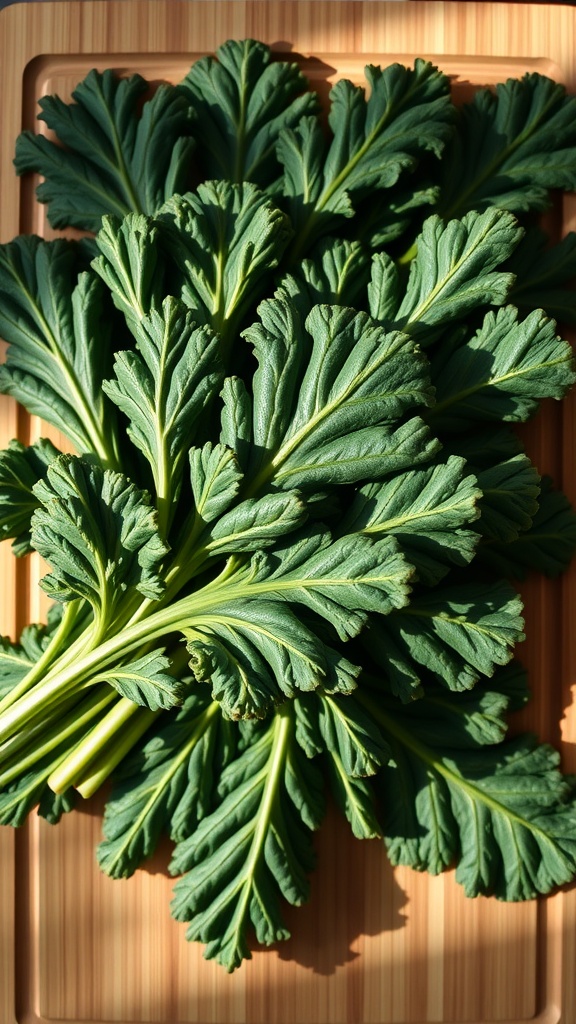
Kale is a leafy green that packs a punch when it comes to nutrition. This vibrant vegetable is known for its rich green color and curly leaves, which are not just pleasing to the eye but also loaded with health benefits.
One of the standout features of kale is its ability to help lower cortisol levels. Cortisol is often referred to as the stress hormone, and keeping it in check is important for overall well-being. Eating kale can be a simple and effective way to support your body in managing stress.
This leafy green is versatile too. You can toss it in salads, blend it into smoothies, or sauté it as a side dish. Its slightly bitter taste can be balanced with a squeeze of lemon or a drizzle of olive oil, making it a delicious addition to any meal.
Incorporating kale into your diet is easy. Try adding it to your breakfast smoothie or use it as a base for a hearty salad. The options are endless, and your body will thank you for it!
15. Walnuts
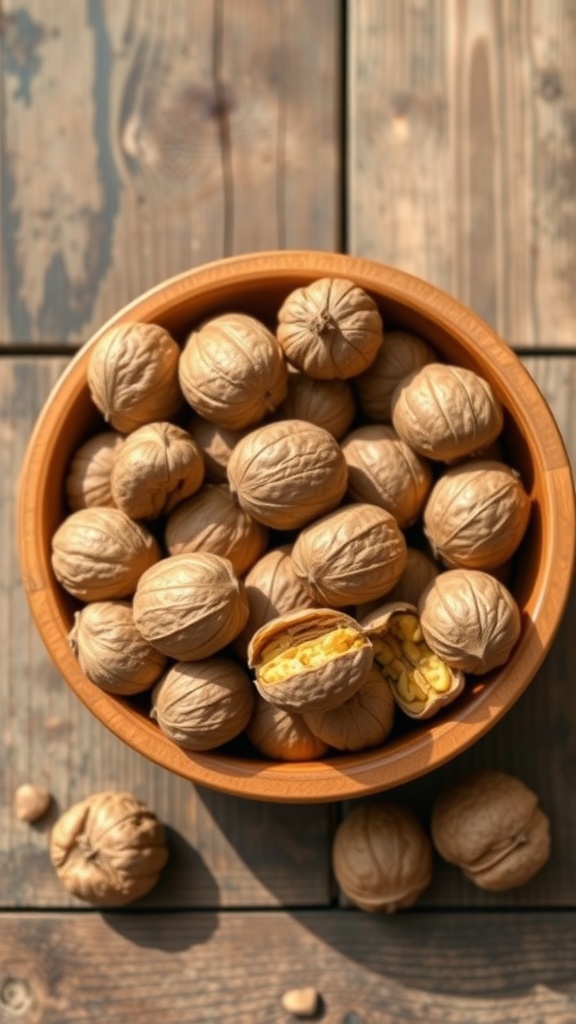
Walnuts are a fantastic snack that can help lower cortisol levels. In the image, you see a bowl filled with these delicious nuts, some still in their hard shells and others cracked open, revealing the soft, golden insides. Their unique shape and texture make them stand out, and they are packed with nutrients.
These nuts are rich in omega-3 fatty acids, which are known to support brain health and reduce stress. Eating walnuts regularly can help manage cortisol, the stress hormone, making them a great addition to your diet. You can toss them into salads, blend them into smoothies, or simply enjoy them as a snack.
Incorporating walnuts into your meals is easy. Try adding them to oatmeal or yogurt for breakfast, or mix them into your favorite baked goods. They not only taste great but also provide a satisfying crunch. So, next time you’re feeling a bit stressed, reach for some walnuts!
16. Sweet Potatoes

Sweet potatoes are not just tasty; they can also help lower cortisol levels. This vibrant root vegetable is packed with nutrients that support your body during stressful times. The image shows a deliciously baked sweet potato topped with a dollop of creamy goodness and a sprinkle of cinnamon. It looks inviting and comforting, making it a perfect addition to your meals.
Rich in vitamins A and C, sweet potatoes boost your immune system and help your body cope with stress. They also contain fiber, which aids digestion and keeps you feeling full. This can be especially helpful when you’re trying to manage stress eating.
To enjoy sweet potatoes, you can bake, mash, or even make them into fries. A simple recipe involves baking them until soft, then adding toppings like yogurt and cinnamon. This not only enhances the flavor but also adds a creamy texture that pairs well with the natural sweetness of the potato.
Incorporating sweet potatoes into your diet is a delicious way to help manage cortisol levels. So, next time you’re looking for a comforting side dish, remember this vibrant veggie!
17. Lentils
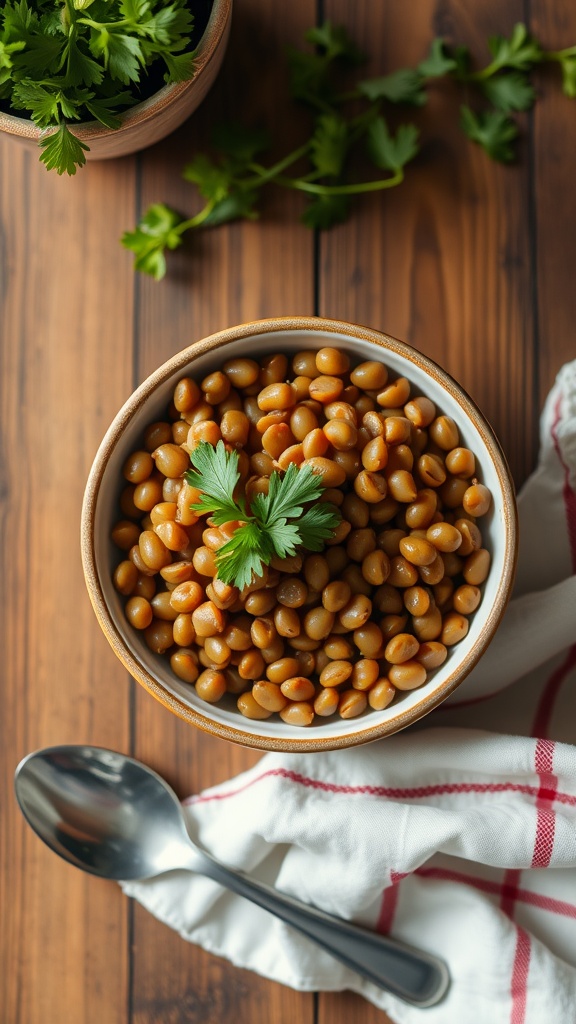
Lentils are a fantastic food choice for lowering cortisol levels. These small legumes are packed with nutrients and are easy to incorporate into your meals.
The image shows a bowl of cooked lentils, garnished with fresh parsley. This vibrant presentation highlights how simple and appealing lentils can be. They’re not just nutritious; they can also be quite delicious!
Lentils are rich in protein and fiber, which help stabilize blood sugar levels. This stabilization can lead to lower cortisol production, making them a great addition to your diet if you’re looking to manage stress.
Cooking lentils is straightforward. Just rinse them, add to boiling water, and simmer until tender. You can season them with herbs and spices for extra flavor. Try adding them to salads, soups, or even as a side dish!
18. Broccoli
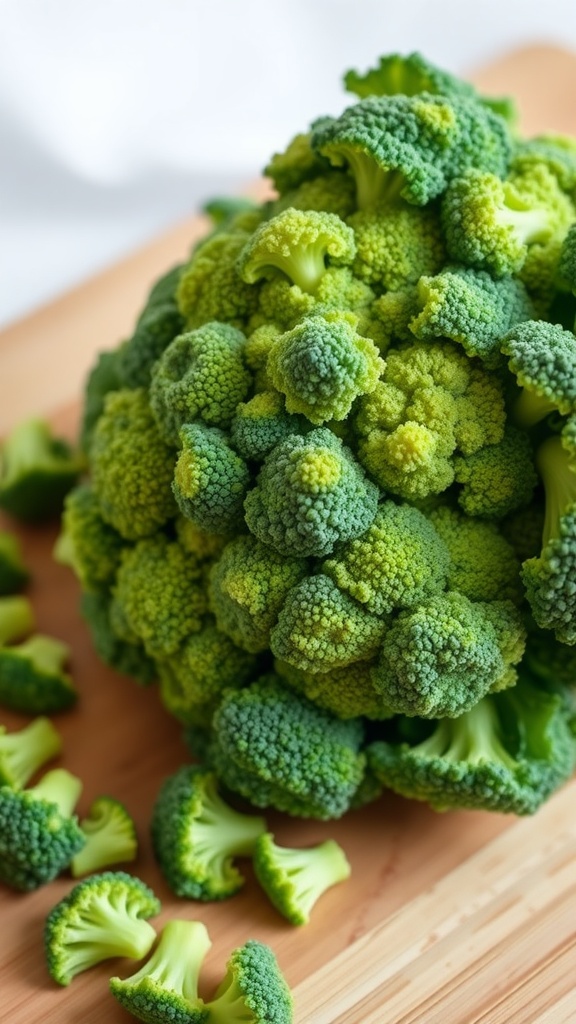
Broccoli is a superstar when it comes to foods that help lower cortisol levels. This vibrant green vegetable is packed with nutrients that can support your body during stressful times. Just look at that fresh, crunchy head of broccoli! It’s not just good for your plate; it’s great for your health.
Rich in vitamins C and K, broccoli also contains antioxidants that can combat stress. Eating it regularly can help your body manage cortisol, the stress hormone. Plus, it’s versatile! You can steam it, roast it, or toss it in salads. The possibilities are endless.
If you’re looking to add broccoli to your meals, try a simple recipe. Just chop up some broccoli, steam it until it’s tender, and drizzle with olive oil and a squeeze of lemon. It’s a quick and tasty way to enjoy this healthy veggie.
